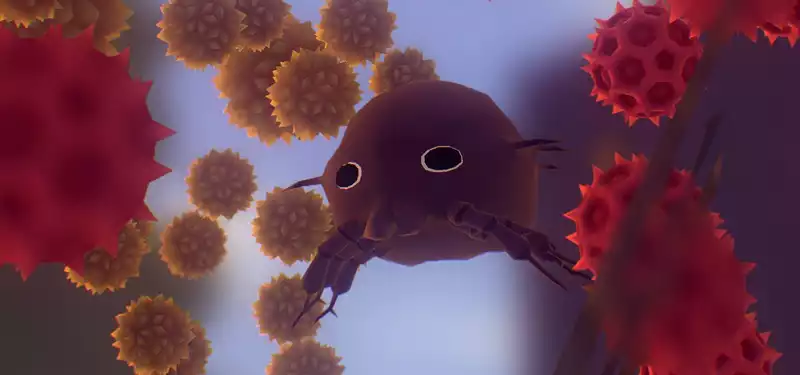Apr 21, 2017
-Everything" creator David O'Reilly talks about the harsh truth of leaving animation.
David O'Reilly's short films have had a lasting impact on the animation world; Please Say Something and The External World are among his landmark works, as are the subversive He also became known for the subversive "Alien Child" video game sequence in Spike Jonze's film "Her" and the "A Glitch is A Glitch" episode of "Adventure Time.
Despite the popularity of these films, however, O'Reilly says animation is a difficult field for him to continue in. Therefore, the filmmaker made a major foray into the game. After the smash hit "Mountain," O'Reilly began work on a new game called "Everything," and it's hard to explain exactly what "Everything" is--OReilly describes it as "a procedural AI-driven game of natural systems, seen from the perspective of everything in the universe. but it is clear that the aesthetic introduced in OReilly's animated shorts remains intact in this game.
Cartoon Brew interviewed OReilly on the eve of Everything's release on Steam to learn more about the shift from animation to games, why he found animation difficult, and what it took to create an ethereal experience like Everything and what it took to create an ethereal experience like Everything.
Cartoon Brew: Can you talk about your transition from animation to games, including "Mountain" and then to "Everything"? Even though my work was very influential, I went from one film to the next and went broke, and even when I did high-profile work, I couldn't sustain the kind of projects I wanted to do. In the world of animation, you are constantly being passed over by people. People love to pester animators all day long for some reason. And very few people really appreciate what you do.
I also know a lot of people who direct animated feature films and have their own TV shows, and they are not happy people. So I started to feel stuck. At the same time, I started playing with game engines, and I had some ideas in that direction, so I followed them.
Can you talk about some of the challenges you faced, both technically and financially, when it came to making short films? Making a short film was always an uphill battle, but it was a lot of fun. I would do it again if I could, but I really don't get credit for it. I would do it again if I could. People tend to think that I get paid for nothing or get grants, but that was never the case for me.
The hard part is that most interesting animation is experienced by people as random crap on the Internet, not an incredible work of art for you. So I went in a completely different direction with "Mountain," and for the first time I actually made money with my work. But I ended up spending it all again.
Regarding "Everything," was there a moment when you suddenly knew what this game should be--how it came into your mind and how it changed over time--
David O'Reilly: The initial outline of Everything is essentially the same as the final game. It is very simple, but it took years to complete. And it has certainly evolved over time and gone in directions I never expected.
Every aspect of the game was created from scratch, so there are hundreds of little stories of how the systems were created and began to influence each other. It's a really organic process compared to filmmaking. That's probably something I'll never be able to write about.
It feels like a huge change from traditional game making. You can also just observe without playing the game. How did you balance the mix of gameplay, simulation and storytelling? You just follow your gut, what works and what doesn't. It's not too different from animation; you have to make a million decisions and know how to move on. I try to make the best I can make and rely on people to be open minded when they approach my work.
In every project, there are rules I have to break in order to achieve my big idea. I think the fun of animation, games, or any art form is in the concept, the story, or the nose and eyeballs that make your brain do what it does.
Was it easy or difficult to transfer what you learned from other film projects to game development? Everything I learned in animation, from the technical aspects to the production process, has been applied to the game. There is certainly a lot to learn, but there is also a lot that I was prepared for. I have always felt that the basic discipline required in animation facilitates many other things.
For example, drawing the human body makes all other kinds of drawing easier. The level of skill required to animate a character walking across a room while saying his lines is higher than 90 percent of other creative work that actually exists in the world.
All are currently available on PS4 and Steam.
.



Post your comment